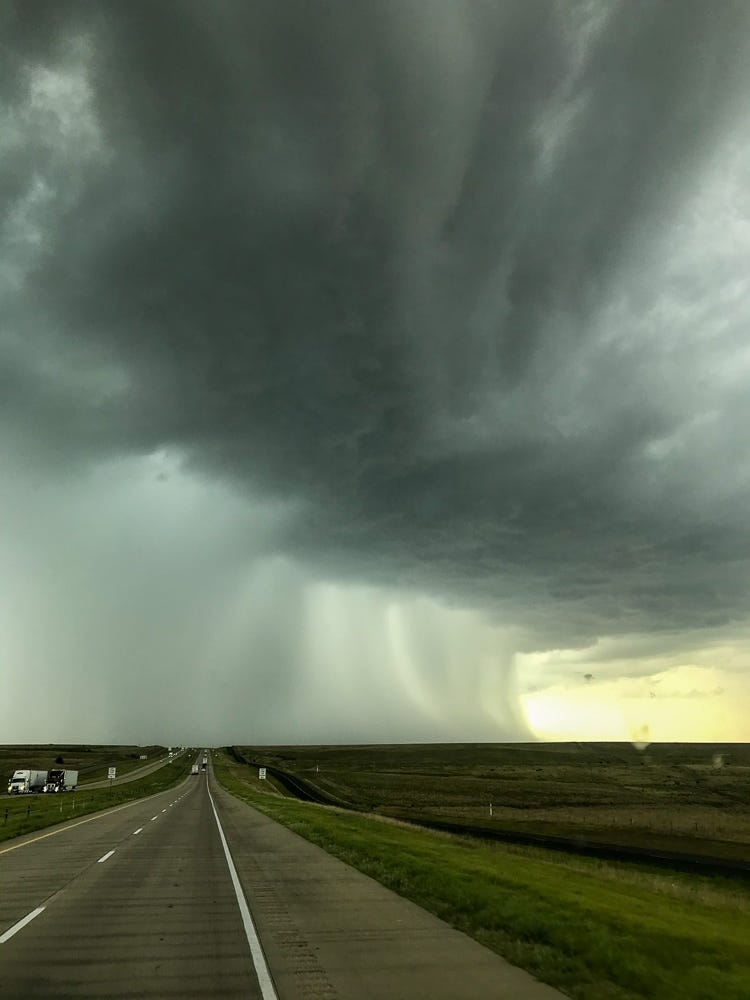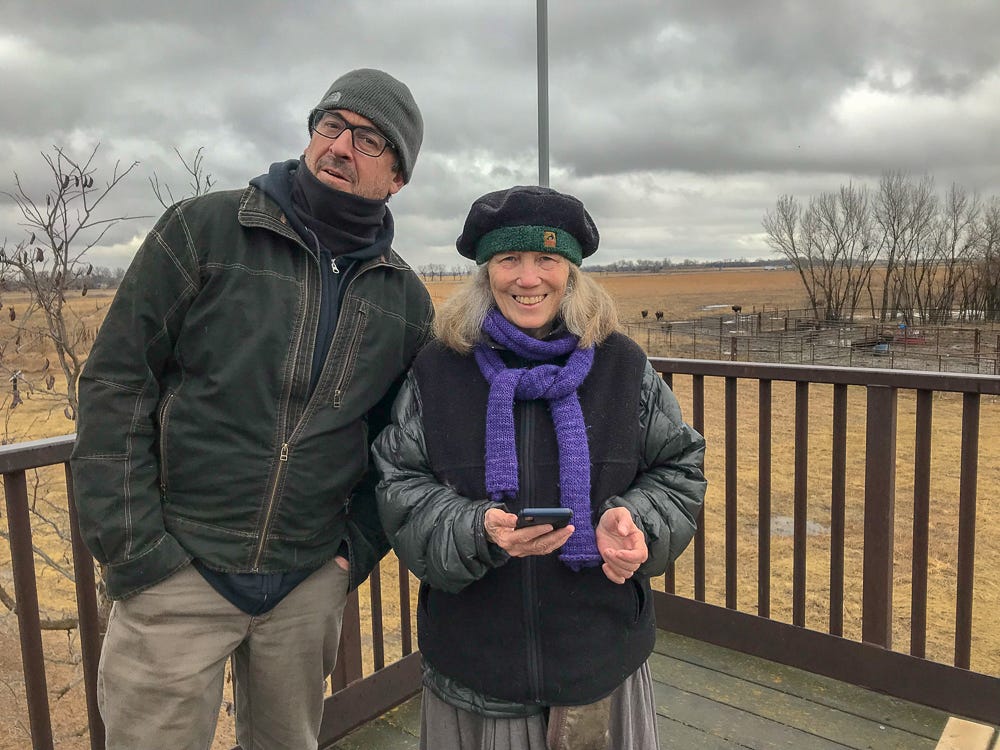Petro-Masculinity & Deregulation Deadbeats
How a snowstorm messed with Texas, and uncovered some bad guys
This has been a happening 24 hours for someone (moi) who likes to show how environmentalism, racism, and poorly behaved white dudes all tie together. I can’t think of a better illustration of this than a polar vortex, mixed with a spectacular infrastructure failure, and crowned by the death of an inglorious liar.
Normally, I intend to keep things upbeat and happy, but today I’ve got to get to the heart of some pressing problems. There’s a lot of misinformation flying untethered out there. So let’s be clear on this:
Renewable energy, socialism, and congresswomen of color are NOT causes of people suffering in the Texas cold.
The blame for the millions who are without electricity falls squarely on the politicians and all-powerful industry leaders who are pointing their fingers everywhere but at themselves, and using a time of national crisis to fuel their climate denial stances.
I would really love for nature stories not to venture into politics. If I say Republican politicians, instead of just politicians, I know it turns some people off. Unfortunately, in this case, it is political. Climate denial is partisan, and the reasons for that have a lot to do with the dead inglorious liar, who we’ll get to down the page.
So when we communicate about climate, it’s not that we want to get political. It’s not that we love Democrats. It’s not even that we are Democrats. It’s that we have no choice but to be clear that currently the biggest barricade to meaningful action is the Republican Party, because nothing short of our civilization is at stake. It is a Republican phenomenon, fueled by petro-masculinity.
We’ll get into that tantalizing word and what caused the mess in Texas in a sec. But first…
a little happy moment with this red-tailed hawk, who Steve and I happened upon during an ice storm in Oklahoma a while back.
What Caused Texas’ Big Fail
The opening words from officials in Texas, as they tried to explain why millions of people were without power, were “wind turbines.” About 10 percent of Texas’ winter power comes from wind turbines. And a few of them did fail, but not because renewables don’t work in the cold. They failed because the power company who erected them cheaped out and didn’t get carbon blades and other cold-weather upgrades. When set up properly, wind turbines run just fine in places like Greenland, Siberia, and Antarctica.
Blaming wind turbines wasn’t a mistake made in the heat of a crisis. It was a calculated (and rather transparent) lie, set up to further Republicans’ climate-denial campaign, which ensures our continued reliance on fossil fuels. Later, some officials kind of tried to retract it, but by then the idea had already been seized on by the conservative media, and off it went to poison the minds of millions of Americans, who now lack the knowledge to make sound judgements on renewable energy. That is really, really crappy, because public opinion will make or break our ability to curtail global warming.
Let’s be very clear on this. This is a big, fat lie.
Texas is known for its love affair with fossil fuels, like natural gas. As such, there were six times as many gas-fueled power plants that went down during this storm as wind ones. Pipelines froze from moisture in the gas, the diesel engines that run the pumps failed, and even one nuclear plant went dark from frozen gear.
This wasn’t a shocker. Cold spells in 1983, 1989, 2003, 2008, 2010, and 2011 showed many weaknesses with Texas’ grid. They knew it was a problem. They said they were going to fix it. They didn’t.
They didn’t because of deregulation.
Texans have their own energy grid, presumably because they don’t want no federal government telling them what to do. They certainly don’t want the feds to oppress their ability to maximize profit by mandating silly safety regulations. In fact, their grid is so Texas-centric that even in an emergency, they can’t connect to outside grids for help. So as power sources started failing, the unregulated, unchecked law of supply-and-demand kicked in.
The wholesale cost of a megawatt-hour in Houston jumped from $22 to $9,000.
The Washington Post spells it out pretty well. “What has sent Texas reeling is not an engineering problem, nor is it the frozen wind turbines blamed by prominent Republicans. It is a financial structure for power generation that offers no incentives to power plant operators to prepare for winter. In the name of deregulation and free markets, critics say, Texas has created an electric grid that puts an emphasis on cheap prices over reliable service.”
Deregulation assumes owners and CEOs will take on the responsibility of regulating their companies, which in many cases would require them to choose options that cost more, but which are neccessary to the health and safety of people and the environment. But corporations don’t choose that, ever. So deregulation doesn’t work. (A quick pause to point out that Texas’ deregulation in other areas is also causing a lot of problems, like chemical plants and plastic factories that are allowed to perpetually contaminate the air and water, and are almost always built in poor communities of color.)
Meanwhile, people are freezing to death. They don’t have water. When their burst pipes thaw, they won’t have houses. Some are going to shelters, risking Covid. Even from a strictly financial aspect, all of this is going to cost a lot more to clean up than it would have cost to upgrade the power plants so they didn’t freeze up.
Instead of helping with this mess, Republican politicians are absent. Ted Cruz decided to sympathize with his frozen constituents from a beach in Cancun (an action that my brother best described as ‘“terrible icing on a poop cake’”).
The newly-resigned mayor of Colorado City, Texas, did one better. He posted a tirade on social media that not only illustrated his exceedingly poor grasp of grammar and spelling, but told residents he owed them “nothing.” He told the people waiting in their homes to have their power restored that they were “too lazy to get up and fend for themselves,” while blaming the “socialist government,” and capping it off with, “I’m sick and tired of people looking for a damn handout!”
Um, Texas’ power grid is most certainly not socialist. As we’ve just learned, it’s quite the opposite. Also, power and water is not what you’d call a government handout. People pay for those services.
But the most messed up part isn’t any of that — it’s his lack of basic decency and severe level of sociopathy. Not only did he not give a crap about helping his neighbors, the people who elected him, but he chose to berate them during a life-threatening crisis. It turns out, this isn’t an isolated incident of one ill-mannered jerk. It’s systemic.
Which leads us to petro-masculinity. A rampant problem that finally got a name.
I only learned the term petro-masculinity a few months ago. It’s a concept that aims to makes sense out of this certain breed of men who embrace a multitude of toxic idealisms, like climate denial, racism, and misogyny, along with a lack of compassion, a deficit of honor and honesty, a contempt for science, and a love of destroying nature for profit.
This breed encompasses people like Ted Cruz, the Proud Boys, Greg Abbott, Mitch McConnell, Rush Limbaugh, and a whole lot of others whose names I’d rather not mention, lest I have to think about them and get more agitated.
Cara Daggett is the political science professor who first coined the term petro-masculinity, and in her 2018 paper about it she says her research, “appreciates the historic role of fossil fuel systems in buttressing white patriarchal rule. Petro-masculinity is helpful to understanding how the anxieties aroused by the Anthropocene can augment desires for authoritarianism. The concept of petro-masculinity suggests that fossil fuels mean more than profit; fossil fuels also contribute to making identities, which poses risks for post-carbon energy politics. Moreover, through a psycho-political reading of authoritarianism, I show how fossil fuel use can function as a violent compensatory practice in reaction to gender and climate trouble.”
My laymen’s interpretation of her statement is that there are a bunch of scared men out there, with a desire to hearken back to the good old days of white America where they felt safe and adequate, because they dominated the conversation and did manly things like blow up mountainsides, drill for oil, and make jokes that demeaned their wives, gay people, vegetarians, guys who like sunsets, and anyone else who threatened their machismo. Now that they are losing iron-fisted control, they are afraid people with better ideas will make them look stupid.
Instead of thinking it would be okay to have an infusion of diversity that could make the world a more pleasant place, they are clinging hopelessly to the past, and to their money-power plays. Their hubristic refusal to confront reality and inability to update their thinking is causing a tremendous amount of suffering to others. And this explains a lot.
Fossil fuels aren’t just about profit, they create identity.
It turns out that the majority of climate deniers are conservative white males with a desire to “protect their cultural identity” over any worries of the loss of a livable planet. That identity is of big, strong men with a desire to maintain the economic system that is dominated by their form of masculinity, and as such, disproportionately benefits them. Fossil fuels are the cornerstone of that system, both on the ground and ideologically speaking.
Another interesting study illustrates the rift between these guys’ idealism and any desire to protect nature. According to this study’s author, Martin Hultman, “There is a package of values and behaviors connected to a form of masculinity that I call ‘industrial breadwinner masculinity.’ They see the world as separated between humans and nature. They believe humans are obliged to use nature and its resources to make products out of them. And they have a risk perception that nature will tolerate all types of waste. It’s a risk perception that doesn’t think of nature as vulnerable and as something that is possible to be destroyed. For them, economic growth is more important than the environment.”
Turns out, this is a bad idea. Ingrained, bad ideas like this are exactly why we need a better diversity of people sharing their ideas.
This newsletter is getting kind of long, and we still have one big topic to make this come full circle, so we’ll get back to petro-masculinity and its iterations some other day. But in the meantime, here are some good reads on why some men get so angry at the Gretas and AOCs of the world and how right-wing nationalism fuels climate denial.
Which brings us to the death of a liar.
But first a wild bit of Texas weather we drove into last summer, and a foxy friend we saw up in the Colorado high country, to break up the mood.
It feels harsh to talk about a dead person before they’re even buried, but Rush Limbaugh is an exception. He was the patron saint of climate denial, toxic masculinity, national division, and fear mongering. Rush Limbaugh was an architect of anti-environmentalism and a pioneer of science denial. After being syndicated in 1988, his radio talk show became the highest-rated in the country, airing on almost 600 radio stations nationwide. Millions of hard-working Americans started their day with him, their trusted voice, over coffee, in small-towns across the land, and all the way to D.C.
“Just listen to me,” he’d say. “I’m the one who’s going to tell you what the news is.”
Then they’d hear him say things like volcanoes are the real reason for global warming. And that scientists were indoctrinated by liberals, and should not be trusted.
“The confident repetition of a lie is usually more powerful than the truth,” author John K. Wilson told Heated. “Rush Limbaugh has talked more about climate change on broadcast media than anyone in history, more than any anchor, reporter, politician, or expert. He has talked about it over and over again for more than 30 years on a show that's on 15 hours a week. And and that kind of repetition of a lie has been incredibly powerful and influential.”
Influential to the point that his lies were a major factor in Republican politicians dropping their good-faith efforts toward finding climate solutions in favor of embracing denial.
Influential to the point that he “had an incredibly powerful effect of putting a lot of conservatives into these silos where they would only listen to other conservatives,” said Wilson. “Limbaugh really trained generations of conservatives—multiple generations of conservatives—to associate the word ‘environmentalist’ with ‘wacko.’ That was one of the most powerful things he did, simply using that phrase over and over again. ‘Environmentalist wackos.’”
It is no stretch to say that one man’s folly and ego-gorging lies will cause suffering around the world for generations to come. As it is for people in Texas right now.
So, is this storm actually climate-change related?
This storm is the result of a wobble in the polar vortex, which we’ve known for few months ago was going to whomp us with some unpredictable weather. Instead of hanging out around the North Pole, the vortex is aimlessly wandering around in new territory. This wobble in particular isn’t necessarily due to climate change, but there is compelling science to suggest that climate change has intensified it. It’s just physics: as we add more carbon to the atmosphere, we upset more hydrological systems, and important stabilizers like the jet stream and the polar vortex, which causes more extreme weather.
Nature News Roundup
There’s so much great stuff going on that I want to share, but in the interest of getting the timely news out, I’m going to send out the rest of the newsletter in a day or two.
A Big Thanks To Mom
My mom always gives me a lot of inspiration and insight — and her proofreading skills help bring you this newsletter virtually typo free — but for this particular story, she gets a special award for ideas and research assistance. Thank you, Mom. I love you!
(Photo: my mom and Steve, who doesn’t care who makes fun of him for liking sunsets.)
If you know someone who likes nature, feel free to forward this along.
Subscribe, and you’ll get the week’s nature rundown, right in your inbox.





